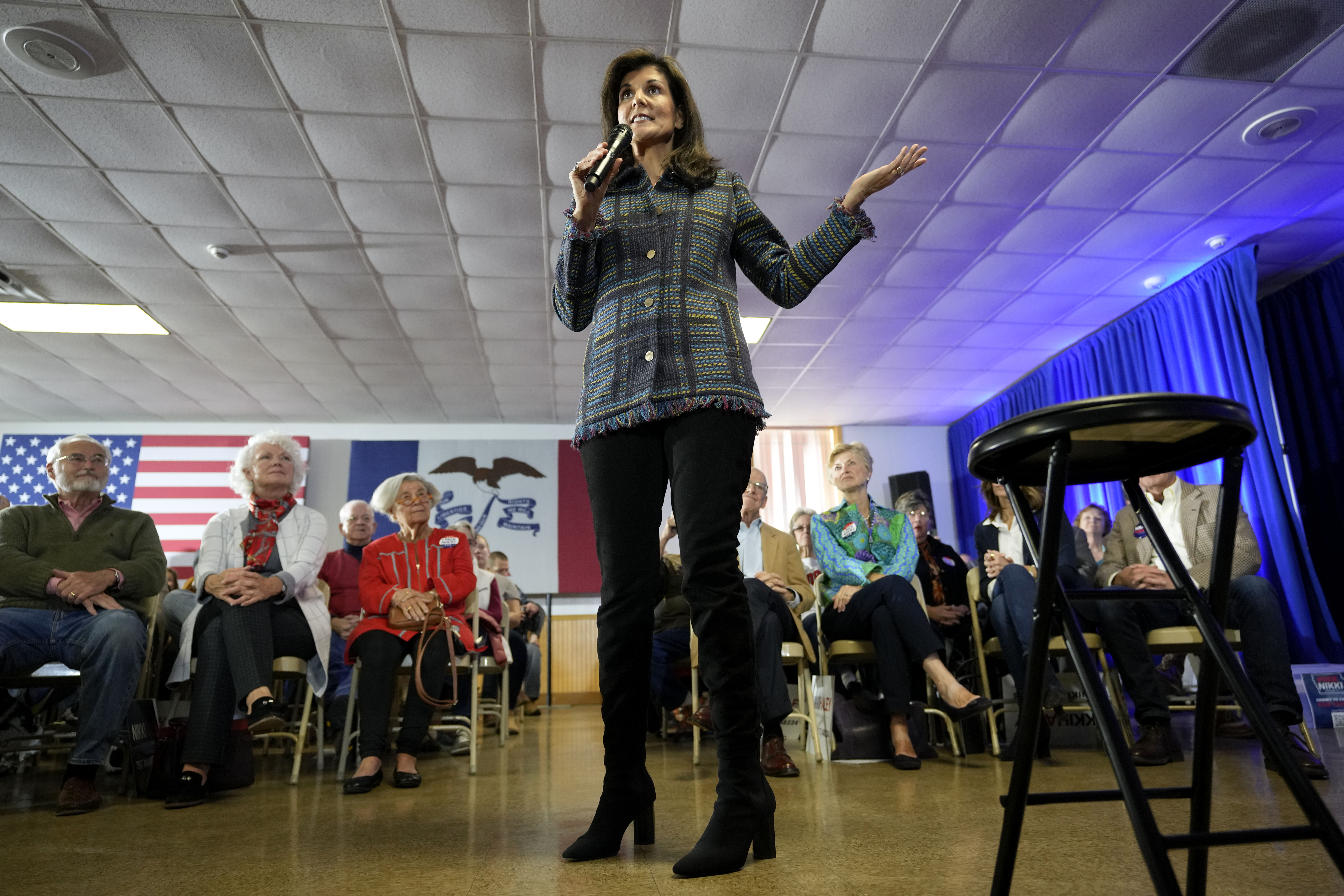Nikki Haley is consolidating the ‘Never Trump’ vote
The former South Carolina governor is drawing support from Trump-skeptical donors and activists in early nominating states.


Two years after Nikki Haley vowed not to challenge Donald Trump for the presidential nomination, the former South Carolina governor who served in his administration and once called him a “friend” is becoming the standard-bearer of the movement to knock him out.
In recent weeks, Haley has drawn a surge in support from Trump-skeptical Republicans across the GOP, including donors and organizers in early voting states. A group of former Tim Scott donors is preparing to host a fundraiser for her in Manhattan. Haley’s campaign events in New Hampshire this week required overflow rooms. And in Iowa — where Haley has steeper competition from Florida Gov. Ron DeSantis — some conservatives are busy corralling support for her.
“Nikki Haley is certainly locking up a lot of the Never Trumpers,” said Matthew Bartlett, a Republican operative who has worked on several presidential campaigns and is unaffiliated this cycle. “She also has real room to grow.”
Donors getting ready to host Haley in New York on Dec. 4 include two people close to Paul Singer, the hedge fund billionaire who has been critical of Trump. Greg Wendt, a former Scott supporter who has donated to moderate, anti-Trump Republicans such as John Kasich and John McCain, is now expressing interest in Haley, according to a New York City-based Republican fundraiser granted anonymity to speak freely about private conversations. And Doug Gross, a Republican operative who was the Iowa GOP nominee for governor in 2002, told POLITICO he plans to caucus for Haley after surveying the field for months in search of an alternative to Trump.
“Never Trumpers and ‘Anybody but Trumpers’ are really consolidating around her from a financial standpoint,” said Gross, who was chief of staff to former Iowa Gov. Terry Branstad.
Haley is benefiting from this recent surge of support. She is now polling ahead of DeSantis in New Hampshire, the first primary state, and in her home state of South Carolina. One recent survey showed her running neck and neck with DeSantis in Iowa.
“I was kind of vacillating between three or four different people,” said Carmine Boal, a former state lawmaker from Iowa who said she’s supporting Haley because she thinks she is the most likely candidate to topple Trump. “The only thing I knew was I would not support him in the caucuses. … I think [Haley] will do well with the independents, particularly suburban women. And everyone knows elections are won or lost by the independent vote.”
Alyssa Farah Griffin, a co-host of “The View” and former Trump White House aide who has been critical of the former president’s candidacy, described Haley on Tuesday as “hands down the best option to beat Trump.”
Still, Haley is running far behind the former president. And in a party he continues to dominate, consolidating the anti-Trump vote is likely to get Haley only so far. In a still-crowded primary, Haley is in some ways the latest manifestation of the challenge confronting all of them: Run hard against Trump, and turn off those who stick by his side. Support him and lose those desperate for a different choice next year.
“It’s a lot of the old-school Republicans who did not like Trump, but voted for him the first time with their fingers crossed, and then refused to vote for him a second time,” Sarah Longwell, an anti-Trump Republican who routinely conducts focus groups of GOP voters, said of Haley’s sweet spot in the primary electorate.
But that is still not where most of the Republican electorate is.
“I do think that most people seem aware that her path is an extraordinarily narrow one,” Longwell said. “I mean, extraordinarily narrow.”
Haley is trying to widen that path by appealing to both the MAGA base and the rest of the Republican Party, as well as to its far-right conservatives and more moderate voters. After months of delivering unspecific answers on abortion policy that aimed to show nuance and compassion at the November debate, she voiced support for a state-level, six-week ban during a candidate forum hosted by a conservative evangelical group in Des Moines last week.
That is not unlike how Haley has approached Trump’s supporters and detractors, going through phases over the last eight years of opposing and praising Trump — and more recently, doing both.
As governor of South Carolina in 2016, Haley spoke out against Trump becoming the Republican nominee, putting her endorsement behind Sen. Marco Rubio. Then, after Trump’s election, her appointment as United Nations ambassador changed her relationship with the now-former president, and she included glowing remarks about Trump in a book she published after leaving the post in 2018.
But Haley in the aftermath of the 2021 riot at the Capitol oscillated between condemning Trump for decisions he made in the White House, to later declaring that conservatives “need him in the Republican Party.”
Now on the trail, Haley has sought to hold space for everyone’s feelings about Trump, repeatedly saying that he was “the right president at the right time,” but criticizing aspects of his foreign policy and personality. Even if she is drawing the support of “Never Trump” Republicans, she isn’t campaigning like one, as former New Jersey Gov. Chris Christie does.
“Where her support comes from are people who are ‘Maybe Trump,’ the people who voted for Trump twice, would vote for him against Joe Biden in a heartbeat, but are worried or at least interested in who else is out there,” said Republican pollster Whit Ayres.
At the moment, it appears to be working, and Haley is about to unleash a torrent of advertising in the final run-up to the early state contests. The Haley camp is currently leading the rest of the field with upcoming television ad reservations. From Thanksgiving week through the Jan. 23 New Hampshire primary, the top two groups to reserve ad time are the Haley campaign and her super PAC, Stand for America Fund Inc.
The Haley campaign so far has booked $4.2 million worth of ads from now to then in Iowa and New Hampshire, while SFA Fund has reserved $3.8 million, according to the tracking firm AdImpact. Haley’s campaign announced it plans to reserve a total of $10 million in television, radio and digital ads in the first two states.
DeSantis, meanwhile, has booked $1.5 million on TV in that same time frame — all in Iowa — and his aligned super PAC, Never Back Down, has $3.3 million worth of TV ads on the books in New Hampshire and Iowa ahead of the New Hampshire primary.
DeSantis is still drawing support of his own from some Trump critics: On Tuesday, Bob Vander Plaats, an influential evangelical leader in Iowa, endorsed him. But while people in DeSantis’ inner circle downplay Haley’s rise, NBC reported Tuesday that the super PAC closely aligned with the Florida governor’s campaign is pulling anti-Haley ads in Iowa because they aren’t well received.
Haley and her campaign are now taking a victory lap, openly claiming ownership of the No. 2 spot in the race, one that belonged exclusively to DeSantis for months.
“There is a growing consensus that Nikki Haley is the best challenger to take on Donald Trump and Joe Biden,” Olivia Perez-Cubas, Haley’s spokesperson, said in a statement to POLITICO. “This is a two-person race — between one man and one woman.”
On Tuesday, Trump spokesperson Steven Cheung said, “Ron DeSantis must be devastated his Never Trump sugar daddies have found someone new.”
The DeSantis campaign declined to respond to Cheung’s comment.












